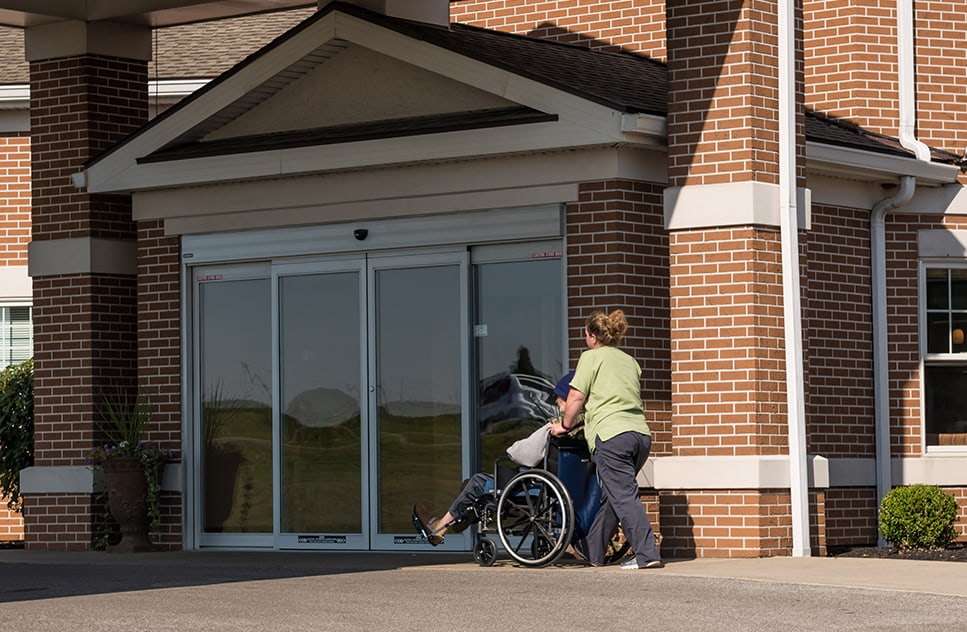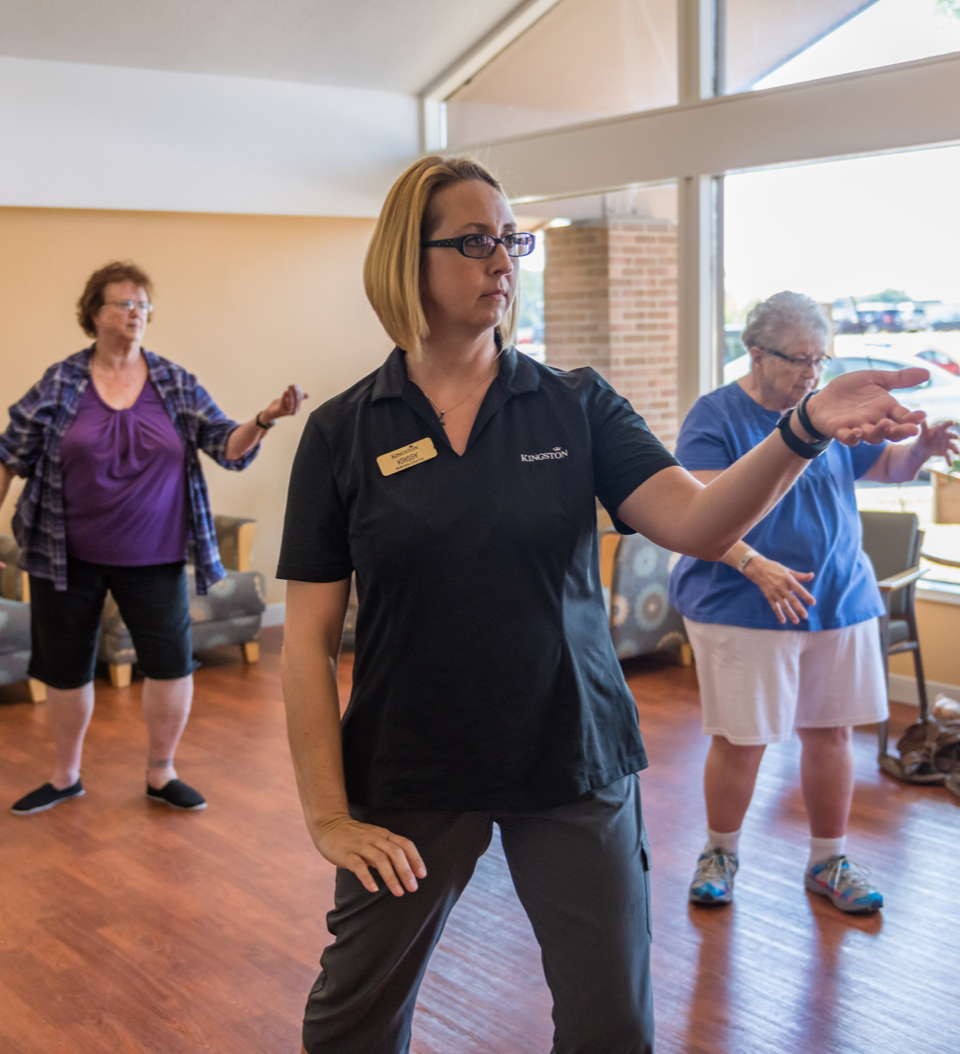Key Takeaways
- Occupational therapy helps seniors maintain independence through daily living skills and safety training.
- Common activities include fine motor exercises, balance training, and cognitive support.
- Available across all senior living settings, from independent living to memory care.
- Medicare typically covers medically necessary occupational therapy services.
- Professional communities provide comprehensive therapy programs with qualified staff.
How Occupational Therapy Helps Seniors Thrive
When you’re considering care options for a loved one, you might wonder how occupational therapy can help them maintain their independence and quality of life. Maybe they’re struggling with daily tasks that used to come naturally, or you’re concerned about their safety at home. Understanding rehabilitation services can provide clarity on the comprehensive support available to help your loved one thrive.
Occupational therapy for seniors focuses on helping your loved one perform daily activities safely and independently, whether they’re living at home or in a senior living community. This personalized approach addresses everything from dressing and cooking to memory support and fall prevention. At Kingston of Ashland, we understand the importance of maintaining dignity and independence through thoughtfully designed therapy programs.
What Occupational Therapy Does for Seniors
Occupational therapy takes a comprehensive approach to supporting your loved one’s daily life. The goal is to help them stay as independent as possible while addressing any challenges they face with everyday activities.
At Kingston of Ashland, our rehabilitation services work closely with residents to create personalized therapy plans. We also offer skilled nursing support when medical needs require additional attention alongside therapy services.
Daily Living Skills Support
Your loved one works with therapists to maintain or regain skills they need every day. This might include practicing how to dress themselves, prepare simple meals, or manage personal hygiene tasks safely. These activities of daily living form the foundation of independent living.
Therapists break down complex activities into manageable steps. They also teach adaptive techniques when traditional methods become challenging.
Safety and Fall Prevention
Fall prevention becomes a priority as balance and mobility change over time. Occupational therapists assess your loved one’s movement patterns and identify potential risks in their environment. They teach safe transfer techniques and recommend modifications to reduce fall hazards. This proactive approach helps your loved one feel more confident moving around their living space.
Cognitive Function Assistance
Memory and thinking skills receive focused attention through structured activities and exercises. Therapists use games, puzzles, and real-world tasks to keep cognitive abilities sharp. They also teach strategies for managing daily schedules and remembering important information. These techniques help your loved one stay organized and engaged in their routine.
Home Environment Modifications
Sometimes simple changes to living spaces make a big difference in safety and independence. Therapists evaluate where your loved one spends their time and suggest practical improvements.
Recommendations might include better lighting, grab bars, or reorganizing frequently used items for easier access. These modifications support your loved one’s ability to navigate their space confidently.

Common Occupational Therapy Activities and Exercises for Seniors
Occupational therapy uses engaging activities that feel meaningful rather than clinical. Your loved one participates in exercises that directly relate to their daily life and personal interests. Many programs incorporate chair yoga and other gentle movement activities to support overall wellness.
Fine Motor Skill Exercises
Hand and finger dexterity activities help maintain the coordination needed for writing, buttoning clothes, or using utensils. Therapists might use crafts, card games, or cooking activities to make practice enjoyable.
These exercises also support hobbies your loved one enjoys, like gardening, knitting, or playing musical instruments. The focus stays on activities that bring them joy while building strength.
Balance and Coordination Activities
Movement exercises improve stability and confidence with walking or standing. Simple activities like reaching for objects, stepping over obstacles, or dancing help maintain coordination.
Therapists adjust these activities based on your loved one’s current abilities. The goal is gradual improvement without pushing beyond safe limits.
Memory and Cognitive Exercises
Brain training activities keep thinking skills active through puzzles, word games, and memory challenges. Many of these exercises feel like social activities rather than formal therapy sessions. Therapists also practice real-world cognitive tasks, like following recipes or managing medications. This practical approach helps your loved one maintain important life skills.
Adaptive Equipment Training
Learning to use helpful tools and devices increases independence when physical abilities change. Your loved one practices with items like grab bars, shower seats, or special utensils designed for easier gripping. Therapists ensure your loved one feels comfortable and confident using any recommended equipment. They provide hands-on training until these tools feel natural to use.
Occupational Therapy in Different Senior Living Settings
The beauty of occupational therapy is its flexibility to meet your loved one wherever they are in their senior living journey. Different communities offer varying levels of therapy support based on residents’ needs.
Independent Living Communities
Residents in independent living often benefit from preventive therapy services. These programs focus on maintaining current abilities and preventing future challenges through wellness activities. Group fitness classes, educational workshops, and individual consultations help residents stay active and informed. The emphasis is on supporting continued independence.
Assisted Living Support
Assisted living residents receive more personalized therapy attention as they navigate changes in their daily abilities. Therapists work with care teams to develop comprehensive support plans. This collaboration ensures your loved one receives consistent support across all aspects of their daily routine.
Skilled Nursing and Rehabilitation Programs
Intensive rehabilitation programs provide focused therapy after hospital stays or during recovery from illness or injury. Your loved one receives daily therapy sessions with licensed professionals. Physical therapy often works alongside occupational therapy to provide comprehensive recovery support.
These programs aim to restore function and prepare residents for their next level of care. Progress is carefully monitored and documented throughout the rehabilitation process.
Memory Care Specialized Services
Memory care communities offer specialized occupational therapy designed for residents living with dementia or Alzheimer’s. Therapists use approaches specifically tailored to cognitive changes. Activities focus on maintaining familiar routines and supporting remaining abilities. The environment is designed to reduce confusion while promoting safe independence.
Getting Started with Occupational Therapy for Your Loved One
Taking the first step toward occupational therapy services doesn’t have to feel overwhelming. With the right information and support, you can find therapy options that fit your loved one’s needs and living situation.
You might notice your loved one struggling with tasks they used to handle easily, or they may have expressed concerns about their safety or independence. Changes in mobility, memory, or daily functioning often signal that occupational therapy could help. Learning about rehabilitation therapy can help you understand the full range of available support.
Don’t wait for a crisis to explore therapy options. Early intervention often leads to more positive outcomes and helps maintain independence longer.
How Senior Living Communities Can Help
At Kingston of Ashland, we understand how important it is to maintain independence and quality of life as needs change over time. Our rehabilitation and skilled nursing teams work together to provide personalized occupational therapy services that help residents thrive in our caring community.
If you’re considering occupational therapy options for your loved one, we’d love to show you how our comprehensive approach supports residents at every level of care. Contact our team today to schedule a tour and learn more about our therapy programs.






